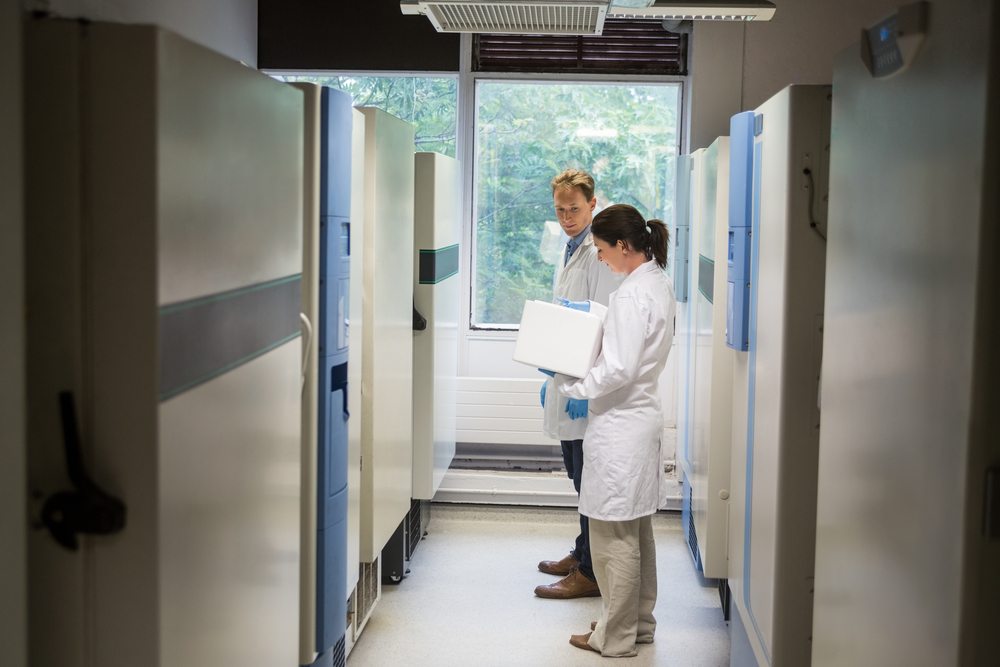For countless labs, selecting the right refrigerator or freezer is essential to maintaining quality control and consistent work output. It’s one of the most important factors in managing your daily operations and preserving the trust of your clients, in addition to selecting apparel.
You might think that it’s as simple as choosing the one that looks best, with the highest storage capacity. However, believe it or not, there are many other things to consider before choosing your unit. In this post, we’ll explore the five most important considerations when selecting your lab’s refrigerator or freezer.
1. Lab Freezer Temperature Range
Naturally, one of the primary concerns when it comes to choosing the right cooling unit is temperature range. More often than not, your work and cooling necessities will dictate the right temperature range. For example, pharmaceutical labs inherently have their own individual cooling needs versus biological labs.
General purpose lab refrigerators, ultra-low temperature (ULT) freezers and cryogenic freezers all have different (and distinct) temperature capabilities.
General purpose refrigerators usually range from approximately 32 to 50 degrees Fahrenheit, with a freezer range of 0 to -22 degrees. ULT freezers range from -30 to -40 degrees Fahrenheit. Cryogenic freezers have a temperature capability of up to -238 degrees Fahrenheit.
General, medical and biological lab settings all have unique needs specific to their work. It’s best to double-check your exact requirements prior to making a decision.
2. Size/Capacity
The refrigerator/freezer capacity is another important factor to consider prior to making a purchase. You want to be sure you can fill your freezer for absolute efficiency. Essentially, the right capacity depends on the volume of samples and materials that need storage.
When evaluating different units, it’s a great idea to look into the external dimensions and confirm the designated lab space. This way, you know precisely what will fit into the space allotted in your lab. Large research institutes, hospitals and laboratories might require bigger units to fulfill advanced storage needs. In some cases, a few smaller refrigerators are the best way to streamline the lab’s efficiency.
Prior to selecting a refrigerator/freezer for your lab, evaluate your storage needs and floor space with as much precision and accuracy as possible.
3. Accessibility
This is another critical factor to consider. When considering units, ask yourself if you’ll be able to get it into the lab, and also: will personnel be able to conveniently access it on a daily basis?
It’s imperative to ensure that there is adequate spatial access to the refrigerator/freezer. Take note of all spatial limitations within the lab. In addition, this is where the dimensions of the unit can come in handy. Make sure you’ll be able to open the doors fully and not interfere with anything else in the lab.
When it comes to accessibility, you can never be too studied or prepared. By double (or even triple) checking the floor space and dimensions, you can avoid unpleasant surprises down the road.
4. Ventilation
When it comes to ventilation requirements, they can differ from model to model. When evaluating units, be sure to inquire about each refrigerator or freezer’s ventilation needs prior to purchase. Essentially, you want to be sure your choice of model can properly ventilate in your lab without any restrictions.
In most cases, the back of the unit ventilates the air out – mostly towards the top. Usually, if the ventilation area is larger, the refrigerator or freezer will be more energy efficient and keep your lab eco-friendly. It’s important to make sure that you’re not obstructing the air inlet or outlet. Additionally, you should check that personnel will be able to clean and maintain the ventilation space on a regular basis. Taking these factors into consideration will help to ensure you keep your lab as cost-efficient as possible.
If you find that you have ventilation restrictions in your lab, ask suppliers if they can accommodate custom ventilation. In some cases, the unit can be adjusted so that the air inlet/outlet is relocated to an area without any obstructions.
5. Monitoring Systems/Additional Features
In many scientific industries, samples and materials don’t just have to be kept cold. They also have to be regularly monitored to ensure they’re not compromised in any way.
Be sure to evaluate your monitoring needs prior to selecting a refrigerator/freezer. Many of today’s modern units are equipped with temperature alarms and data tracking screens. If the temperatures reach a point where samples or materials can be compromised, an alarm will sound notifying personnel of the change.
There are plenty of other modern features lab refrigerators and freezers come equipped with. Backup battery systems, digital locks, temperature alarms and chart recorders are just some of the many features you can have included with your lab’s refrigerator or freezer unit.
Conclusion
There are plenty of questions to ask prior to choosing your lab’s optimal refrigerator/freezer. However, these five are critical in helping you to narrow down which is best for you and your lab.

| Call for Immediate Lab Services |
|---|
| Long Island, Nassau & Suffolk County Call: 516-333-4006 |
| The Bronx, Manhattan, Brooklyn, Queens, & Staten Island Call: 718-885-0833 |
| Albany & Southern New York State Call: 800-564-5513 |
| Piscataway, Northern & Central New Jersey Call: 800-564-5513 |
| Danbury Connecticut & Surrounding Areas Call: 203-748-7343 |
24/7 Emergency ServiceCall: 1-800-564-5513 |